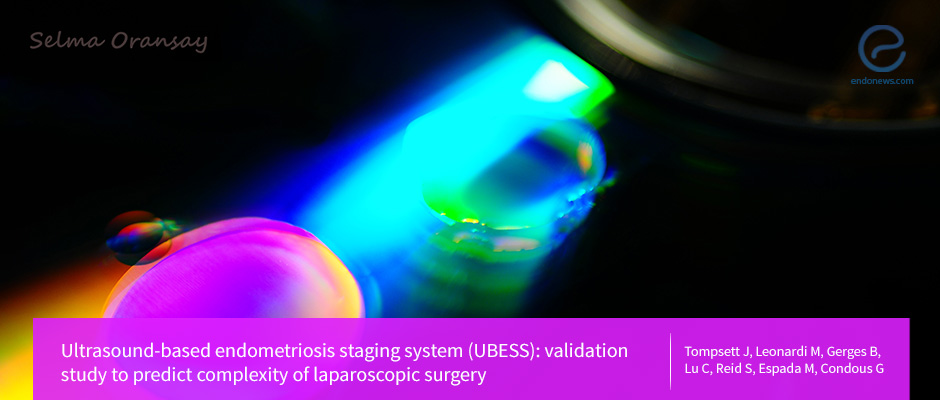Can we predict the complexity of laparoscopic surgery by ultrasound?
Aug 2, 2018
The overall accuracy of ultrasound-based endometriosis staging system to predict the complexity of the laparoscopic surgery is high
Key Points
Highlights:
- When the preoperative UBESS scores are compared to the postoperative RANZCOG/AGES laparoscopic skill levels of patients, the overall accuracy of UBESS in predicting the complexity of the laparoscopic surgery level is high.
-
Ultrasonographic scores could be successfully utilized to predict the level of complexity of laparoscopic surgery for endometriosis, with an overall accuracy of more than 98%.
Importance:
- UBESS classification may have the potential to reduce the number of patients who experience a traditional two-step laparoscopic approach.
What's done here:
- This is an observational study to assess the preoperative UBESS scores to estimate the RANZCOG/AGES complexity of laparoscopic skill levels.
- The authors collected preoperative ultrasonography scores of the patients and compared to the postoperative complexity of laparoscopic skill levels to see the accuracy, sensitivity, specificity, positive and negative predictive values and positive and negative likelihood ratios of two procedures.
- The results were evaluated by the appropriate statistical methods to see the significance.
Key Results:
- This study found higher specificity and sensitivity rates of surgical skills when compared to a similar article published in 2016, by Menakaya et al.
- RANZCOG/AGES 98.1%.
- Authors indicate that the preoperative use of UBESS staging system could be utilized to predict the level of complexity before laparoscopic surgery of endometriosis and this outcome still needs external validation in multiple centers.
- On the other hand, rapid evolving ultrasonography of endometriosis and possible alterations of UBESS staging system may also lead to modifications in RANZCOG/AGES surgical skill standards.
Limitations:
- All scaling systems need highly experienced ultrasound operators and laparoscopic surgeons.
- In patients who have pelvic and Douglas obliterations as well as colorectal lesions, UBESS classification can not specifically utilize.
Lay Summary
This is a multicentric, retrospective cohort study recently published in the Journal of Minimally Invasive Gynecology by Tompsett et al. in which the results of the transvaginal ultrasonographic examinations (TVS) are compared to the results of the laparoscopic operations performed in the Department of OB/GYN Wollongong Hospital, New South West, Australia.
Hundred and fifty-five women in their reproductive ages, who have chronic pelvic pain at least six months or a history of endometriosis, underwent TVS examination at Nepean Hospital, and a private clinic. Ultrasonography based endometriosis staging system (UBESS) classified the patients by scoring I-II and III, based upon histological phenotype of endometriosis, anatomic locations, and local invasions, after their ultrasonographic examinations.
At most six months later, minimal invasive surgeons who performed the laparoscopic operations of these patients, evaluated and scored them based on the RANZCOG/AGES skill levels, (1-6) without knowing their UBESS scores. Cohen's Kappa statistic used to determine the level of agreement between ultrasonographic UBESS scoring and laparoscopic ease scores.
UBESS I to predict RANZCOG/AGES skill level 1-2 obtained as the most accurate, while UBESS II predictions are the most complicated to evaluate. The authors found out that UBESS III to predict RANZCOG/AGES skill level 6 category patients, required a surgeon with most advanced skill rate for their operation. ”It now needs to be externally validated in multiple centers with various surgical skill level classification systems to assess the general applicability” concluded the team.
Research Source: https://www.ncbi.nlm.nih.gov/pubmed/?term=29890354
UBESS transvaginal ultrasonography endometriosis staging system laparoscopic surgery.

